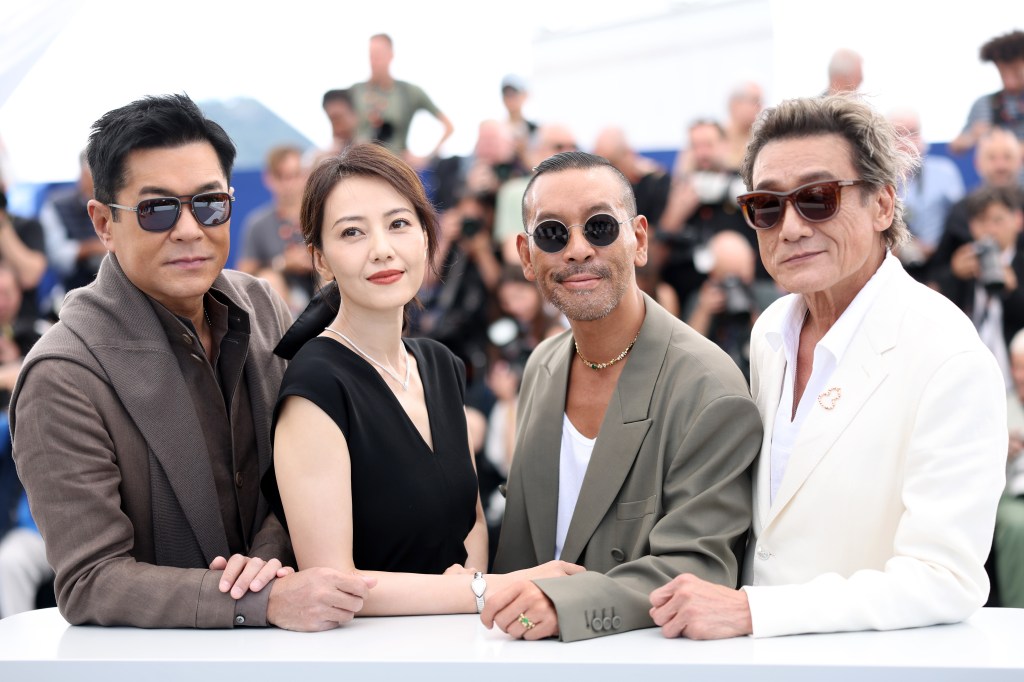After a marathon 10-year production journey, Hong Kong dystopian thriller Sons of the Neon Night finally hit the red carpet yesterday, premiering in the Midnight Screenings section of the Cannes Film Festival.
Starring veteran actors Takeshi Kaneshiro (Chungking Express), Sean Lau (Papa), Tony Leung Ka-fai (Double Vision), Louis Koo (Twilight of the Warriors: Walled In), and Gao Yuanyuan (Blind Detective), Sons of the Neon Night is written and directed by Juno Mak, who is also a record producer and musician.
Leung and Mak sat down with Deadline to talk about shooting in a “wintry” Hong Kong, a “magical” six-hour music session with the late Ryuichi Sakamoto — and they also call on audiences to keep coming back to cinemas.
Sons of the Neon Night is set in an alternative, snow-covered Hong Kong. The death of a pharmaceutical company chairman unleashes a wave of chaos and power struggles in the underworld, while his youngest son attempts to break away from his family’s criminal legacy.
Yesterday’s glitzy Cannes premiere brought back many memories of the production — which wrapped in 2017 — for veteran Hong Kong star Leung.
“Last night gave me a deeper kind of feeling about what I did seven years ago,” Leung tells Deadline. “This is the second time I have watched the film, and I have a new angle to see the film and my character.
“The background seems like Hong Kong, and we can tell that it is a very modern city,” adds Leung. “The film is all about humanity, where this kind of story happens all over the world, in big cities every day. Everybody’s rushing and they don’t have time to notice what’s going on, the battles around us, killings and sufferings.”
Mak sheds some light why it has taken so long to bring Sons of the Neon Night to the big screen — with the film marking his sophomore feature after 2013 horror film Rigor Mortis.
“We finished principal shooting in 2017 but as we were working on post-production, the pandemic hit and there was a delay,” says Mak. “Especially because Sons of The Neon Night revolves around heavy CGI, it has taken quite some time.”
Mak also says that navigating the film financing journey was also an eye-opening experience.
“When I was putting together Sons, I felt that most of the investors were really interested in a sequel or prequel for Rigor Mortis,” says Mak. “It would have been easier if I had made that choice, but I felt that as a filmmaker, it’s more important to find your truth, so back then, I didn’t want to cage myself working on the same genre.”
Mak also knew that to realize his vision for Sons fully, the film would require a hefty budget.
“Presenting this script to the investors, they knew just by reading the script that it was going to be a rather big-budget type of film, but the genre has commercial elements in it, I believe, because the crime genre is quite popular in Hong Kong,” adds Mak. “Being able to inject new elements and angles to it — that’s what got the investors’ curiosity and that’s how the whole thing came together, piece by piece.”
Bringing audiences back to the theaters
Looking back at his decades-long career, Leung shares what still keeps him excited about filmmaking and cinema.
“I’m very lucky to have 40-something years of experience, I’ve been in around 150 movies, and I didn’t repeat any of my characters,” says Leung. “I’m so lucky that nearly all the characters are so different with my real-life self. I’ve got the chance to go through 150 different lives and that makes me so full and satisfied. Every movie and every character give me a new life.”
Leung has weathered the ebbs and flows of Hong Kong cinema — through the years of plenty and years of challenges. He shares his concerns about the state of theater-going today, and points out the importance of cinemas for people to gather and have a shared experience.
“I want the audience to go to the cinema because cinemas are quiet and make you slow down for two hours to find your own humanity through the story,” says Leung. “All over the world, cinemas are having a hard time. We’ve all noticed that audiences have changed their platforms from the cinema to the iPad or even cell phones.
“Cinema is very important because you can gather hundreds of people in an area to watch a dream — no matter if it is a nightmare or sweet dream — you are in one dream, the director’s dreamscape,” adds Leung. “When the film starts, you breathe together, you smile, laugh and cry together… So, please come back to the cinema.”
Challenges with weather in ‘Sons of the Neon Night’
Early in the film, snow falls upon the city of Hong Kong — an unusual sight, given that Hong Kong does not experience snowfall in real life. This jarring image pushes audiences to imagine and inhabit a different kind of reality.
Sharing his thought process behind setting Sons of the Neon Night in such an environment, Mak says: “There was a time where I was very interested in cold places. I traveled to a lot of cold places and felt that weather definitely affects how a person thinks.”
Mak says that around 80 percent of the snow seen in the film were physically produced on set, with the remaining 20 percent created via visual effects. He brings up a shot from Rigor Mortis, where the main character is imagining a world that is snowing — and says that he sees the world of Sons of the Neon Night as a kind of continuation from that imagination in his previous film.
“I was traveling the festival circuit for Rigor Mortis. We started off in Venice, and then we went to Toronto and when I was in Toronto, jet-lagged again, I started writing the first scene for Sons.
“I’ve always been attracted to having a sense of alienation,” says Mak. “I have a curiosity for it. Rigor Mortis was a re-imagination of the Mr. Vampire genre, while Sons is a sort of re-imagination of the crime drama genre.”
Production for Sons was a tale of two polar opposite weathers.
At the start of the production, running around in coats and thick jackets in the 85-degree Fahrenheit Hong Kong summer proved challenging for the actors. By the end, the shoot moved overseas to South Korea and the actors were filming in the country’s sub-zero winter.
Leung says: “The director was very patient, although we were always having a hard time, as we went from over 30 degrees [Celsius] to many degrees below zero. We had to wear those wardrobes, and we had to have that makeup.”
Collaborating with the late Ryuichi Sakamoto
The theme music for Sons was composed by the late Japanese legend Ryuichi Sakamoto, with English composer Nate Connelly also on board for the film’s music.
Mak says that he was not personally connected to Sakamoto, prior to Sons.
“Halfway during the shoot, when I was prepping for the Korea scene, I thought of Ryuichi Sakamoto, but I didn’t personally know him,” says Mak. “But I used to work in music and I did some collaborations in Japan, so I started speaking with musicians in Japan, and that’s how we got connected. It was a very magical experience, because at that time, Sakamoto was living in New York, and I was working in Hong Kong, but was also about to fly to Korea.
“We started talking, and I presented all the concept art, music references, the vibe for the film, and Mr. Sakamoto has this passion for cold weather as well,” adds Mak. “I think that’s how it got him interested in the first place. Since we are quite far apart, we chose Tokyo as a middle point. That session was very magical. We sat there for six hours, he started playing the music, and we were finding the direction for the film’s theme.”
The post Tony Leung Ka-Fai & Juno Mak Talk ‘Sons Of The Neon Night’, Calls On Audiences To Treasure Cinemas — Cannes Film Festival appeared first on Deadline.




